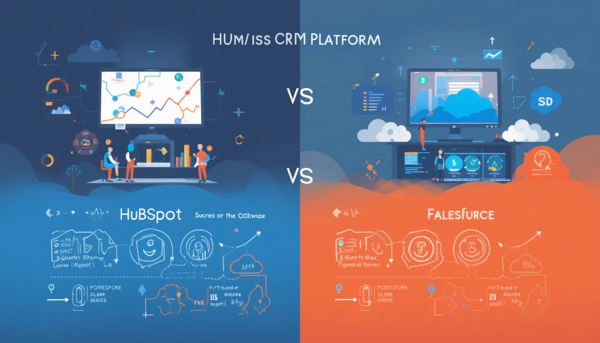HubSpot vs Salesforce pricing explained. Discover which CRM gives you the best value for your money with this detailed, honest breakdown.
HubSpot vs Salesforce Pricing Comparison
🤔 Which CRM Really Fits Your Budget?
Ever wondered if HubSpot or Salesforce is worth it? Both are top CRMs, but price matters a lot. If you run a U.S. business, knowing where your money goes is key.
HubSpot starts free and costs more as you add features. Salesforce costs more right from the start. Your choice depends on whether you like simple growth (HubSpot) or deep customization (Salesforce).
Let’s explore HubSpot vs Salesforce pricing together. We’ll look at hidden costs and compare features. This way, you can choose wisely.
💡 Key Takeaways
- HubSpot starts free, Salesforce does not.
- HubSpot costs grow as you add more features.
- Salesforce offers customization but costs more upfront.
- Small businesses often choose HubSpot, while big ones prefer Salesforce.
- Don’t forget about onboarding, training, and integration costs, not just subscription fees.
🚀 Quick Answers
- Cheapest entry point? HubSpot (free CRM plan).
- Best for scaling? Salesforce, despite higher costs.
- Hidden costs? Yes, both have add-ons that increase price.
- Best for small teams? HubSpot.
- Best for enterprise? Salesforce.
📊 HubSpot vs Salesforce at a Glance
| Feature | HubSpot | Salesforce |
|---|---|---|
| Starting Price | Free | $25/user/month |
| Most Popular Plan | $1,600/month (Professional) | $150/user/month (Enterprise) |
| Free Version | ✅ Yes | ❌ No |
| Setup Complexity | Easy | Moderate–High |
| Best For | SMBs, startups | Enterprises, scaling orgs |
🔍 Understanding HubSpot Pricing
HubSpot pricing is tiered and modular. It seems flexible but can get pricey quickly. You start free with basic CRM features. Adding more hubs (Marketing, Sales, Service, CMS) increases costs.
For example, HubSpot’s Starter plan starts at $20/month per seat. But, for advanced automation, you need the Professional plan, starting at $1,600/month. Enterprise plans cost even more, scaling past $5,000/month with add-ons.
The good thing? You only pay for what you use, and upgrades are easy. But, many businesses don’t realize how fast costs can rise with advanced features like reporting, workflows, or integrations.
🏢 Understanding Salesforce Pricing
Salesforce charges by the user each month. The cheapest plan, Essentials, is $25/user/month. But, most teams go for Professional ($80/user/month) or Enterprise ($150/user/month).
But, there’s a catch. You might need to pay extra for some features. For example, advanced analytics or industry-specific customization. Training and onboarding also cost extra.
Despite this, Salesforce is great for big teams. It offers deep customization and top-notch features. If you need tailored workflows and automation, the cost might be worth it.
💰 HubSpot Pricing Breakdown
| Plan | Monthly Price | Key Features |
|---|---|---|
| Free | $0 | Contact management, email tracking, forms |
| Starter | $20/seat | Ad management, email marketing, simple automation |
| Professional | $1,600/month | Advanced workflows, reporting dashboards |
| Enterprise | $5,000+/month | Predictive lead scoring, advanced permissions |
💼 Salesforce Pricing Breakdown
| Plan | Monthly Price (Per User) | Key Features |
|---|---|---|
| Essentials | $25 | Basic sales tools, lead management |
| Professional | $80 | Forecasting, pipeline management |
| Enterprise | $150 | Custom workflows, automation |
| Unlimited | $300 | Premier support, full customization |
⚖️ HubSpot vs Salesforce: Cost of Ownership
HubSpot seems cheaper because it has a free version. But, adding professional features can make it as expensive as Salesforce.
Salesforce might seem pricey at first. But for big teams, its per-user model is more predictable than HubSpot’s add-ons.
HubSpot is cheaper to start but gets expensive as you grow. Salesforce is expensive at first but good for big growth.
🧾 Hidden Costs to Watch Out For
Both CRMs have hidden costs that people often miss:
- Onboarding & training (Salesforce often requires paid training)
- Integrations with third-party apps
- Storage fees for large datasets
- Premium customer support packages
- Customization and consulting fees
These extras can add thousands of dollars a year. Always plan for more than the initial cost.
🎯 Which CRM Fits Small Businesses Best?
For small businesses or startups, HubSpot is usually the best choice. It has a free plan to start with. Plus, it’s easy to use, so you don’t need much training.
Salesforce is powerful but too much for small teams. It’s expensive, complex, and hard to set up for small companies.
Unless you’re growing fast, HubSpot is the safer and smarter choice for small businesses.
🌍 Which CRM Fits Enterprises Best?
Enterprises often choose Salesforce. It’s because Salesforce offers more customization and depth than HubSpot. Salesforce is great for complex needs, global teams, and detailed reports.
HubSpot can also work for big companies, but costs can go up quickly. If you need special modules or 24/7 support, Salesforce is better.
🧩 Integration & Add-On Costs
HubSpot works well with many tools, often for free or a little cost. But, advanced marketing tools can make prices go up.
Salesforce also connects well with tools, but you might need to pay for some. This is because many integrations come from its AppExchange marketplace.
Both CRMs can work with most business tools. But, Salesforce add-ons can cost more.
🕒 Time-to-Value: Which Is Faster?
HubSpot is quick to set up. Most teams start using it in a week. It’s easy to use, so you can sell more.
Salesforce takes longer to get started. It needs weeks or months of training and setup. It’s worth it for big companies, but small teams might find it hard.
📝 Deep Comparison: HubSpot vs Salesforce Value
When looking at value for money, it depends on your size:
- Startups & SMBs → HubSpot is a better deal at the start.
- Growing mid-sized businesses → Both are good, but watch your budget.
- Large enterprises → Salesforce is better for big needs and support.
It’s not just about price per seat. It’s about how much productivity and growth the CRM brings.
📚 FAQs
1. What is cheaper, HubSpot or Salesforce?
HubSpot is cheaper at first because it has a free version. Salesforce is more expensive but predictable as you grow.
2. Can HubSpot replace Salesforce for enterprises?
It can, but costs rise fast for big companies. Salesforce is better for complex, global needs.
3. Does HubSpot charge per user?
Yes, most paid tiers charge per seat. But, some hubs have fixed monthly costs, unlike Salesforce.
4. Is Salesforce harder to use than HubSpot?
Yes, Salesforce is harder to learn. HubSpot is simple, while Salesforce needs training and setup.
5. Are there hidden fees in both CRMs?
Yes. Both have hidden costs like setup, integrations, and premium support. Always plan for more than the listed price.
🎯 Conclusion
So, who wins in the HubSpot vs Salesforce pricing comparison? It depends on your business size and growth stage.
- Choose HubSpot if you’re a small business that values simplicity and a free start.
- Choose Salesforce if you’re an enterprise needing scalability and customization.
Both CRMs are powerful. The right choice depends on your budget, team size, and growth goals.
References
https://www.hubspot.com/pricing
https://www.salesforce.com/editions-pricing/overview/
https://www.g2.com/compare/hubspot-vs-salesforce








Leave a Reply